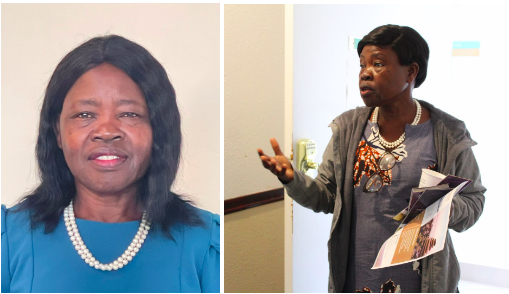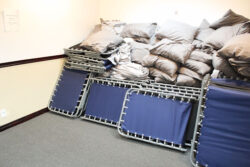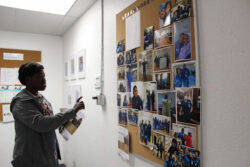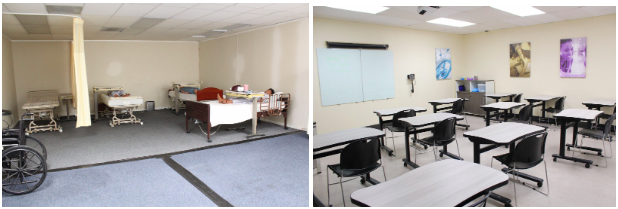
By Tihut Tamrat, Contributing Writer
“Let them give.” said Elizabeth Lou, Founder and Director of the Nile Sisters Development Initiative in addressing the most persistent challenge she faces running her non-profit organization in City Heights, San Diego. Funding has become a recurring nightmare for the Nile Sisters as their competitors are white-male led organizations who have an advantage and “people who are advocating for them, their voice can be heard,” asserts Lou.
Elizabeth Lou, refugee from Sudan, mother of five kids and to the community around her, does not have that same advantage. Lou’s journey began in Sudan, where she and her family had to flee due to violent flare-ups of Civil Wars between rebel groups and the government causing mass displacement. Lou’s husband, contracted for the United Nations High Commissioner for Refugees (UNHCR), a highly coveted position resented by rebel groups put in a successful transfer to Kenya in hopes for a peaceful life.
While in Kenya, Lou continued her training in relief services, gained from the Sudan Council of Churches, working for the East African Technical Committee, researching the impact of war on the South Sudanese, especially children displaced. Here Lou learned the skills and tools that contributed to her foundation of the Nile Sisters Development Initiative.
In a year’s time the contract in Kenya was ending, however they still could not go back to Sudan as wars had gotten worse, so together with their kids, they headed to San Diego. Lou recalls the arrival:
“I arrived in ‘99 on June 3rd late in the evening, around 5 or 6pm, it was raining a little bit.

Coming from a different continent, system, and culture, I find it was very challenging to get myself started in the new country.”
Lou continues, “I did not receive support, unfortunately. I depended on myself. Every single document I received, either from welfare or from school, from my children, I read them all by myself. I enrolled my children all to school by myself.”
As a newcomer, Lou had to learn how to understand the money, use the laundromat, and navigate the complexities of our bus transportation system. “I stood and the bus also stopped going because I did not pay. I did not pay because I did not know how. Everybody was looking at me. This disabled man took a bus token from his own pocket and gave it to me, when the driver saw the exchange between me and him, the driver, knowing what it was, pressed the button and the bus started going,” expresses Lou.
“I felt so grateful. This man opened my eyes to know how to use the bus system. He
helped me. Now I’m helping other people,” emphasized Lou. That was the seed that started the Nile Sisters Development Initiative.
The Nile Sisters Development Initiative (NSDI), founded by Lou in 2001, supplies emergency relief services, caring for and housing, refugees, immigrants, and those without protection, to nurture them with resources that will acclimate, acculturate, advocate, and educate, resettling and relocating refugee and immigrant families to help them overcome barriers to social and economic self-reliance.
NSDI also provides behavioral health services such as counseling, caregiving, and

educational programs that will launch them directly into employment. One of which being the LearnMore nurse assistant training program that provides enhanced theory, lab, and supervised clinical instruction to prepare students for the California Department of Public Health examination and employment in the healthcare sector, the quickest and most economically stable profession.
Lou tells Voice & Viewpoint what sets NSDI apart from other non-profit organizations: “Our services are so tangible that people in the community are the ones who bring them to our office because they know we are real, because they know when the people come here they will receive the absolute best service. We care.”
But above all, her inspiration is that “[she] sees change in the service [they] provide to the people. From desperation, to instability, to thriving. That is what keeps me moving.”
However, Lou has had challenges with funding. “It takes the grace of God for us to be considered for funding, not everybody likes Africa,” explains Lou. “Some funders will choose certain groups of Africans, so those who are not of their liking will not get funded. This puts Africans fighting head to head. That is exactly the kind of fight I see here in City Heights.”
Lou stresses that “this work, nobody can do by themselves. I need volunteers, I need advocates, I need donors and funders to come along.”
Luckily, churches have been the saving grace of the Nile Sisters. Local churches come together to give funds to at least keep the lights on, if not give the resources they do have. But it is still not enough.
Since its inception, Nile Sisters have accomplished and achieved a lot. “We started small, we started from my garage, and from my garage we opened a small suite. We moved to almost 10 different offices, now we bought this property to really expand our services. Buying the property in 2022 was a huge milestone for us,” says Lou excitedly.

Now, “We are serving four continents on earth, regardless of your color, your religion, your background, your gender, we are serving everybody. We are very diverse,” states Lou. This contributed to how they got their name. “Nile is symbolic in Africa, and it doesn’t end only in Africa, it goes through Europe and across the world. We believe that the Nile is a blessing, it brings nutrients, fish, and food from across the globe. We were all women doing the work so this is the initiative of the sisters,” declares Lou.
Recalling her time as a refugee, Lou leaves advice for those in a similar position when she came to San Diego, “Take advantage of the available resources that Nile Sisters have until you become financially stable. We want to help you be on your own, be stable and move on with your life,” urges Lou.
Lou aspires to expand the Nile Sisters and to start other initiatives. She also dreams of opening another satellite location in Washington D.C. just as she has in Sacramento and in LA. The only thing she needs is funding.
She leaves us with her last statement: “I want to appreciate those who have given me already. And ask those who have not given, let them give.”
So now it’s our turn, let us give.
To give your time, resources, or money, visit nilesisters.org. To learn more about Elizabeth’s past, read Chapter 9 of Tears of War: Stories of Refugee Women by Anne Hoiberg.
This resource is supported in whole or in part by funding provided by the State of California, administered by the California State Library in partnership with the California Department of Social Services and the California Commission on Asian and Pacific Islander American Affairs as part of the Stop the Hate program. To report a hate incident or hate crime and get support, go to CA vs Hate.


